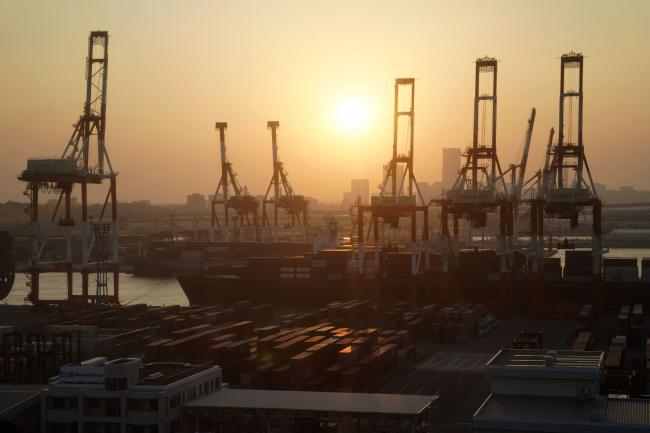(Bloomberg) -- Terms of Trade is a daily newsletter that untangles a world embroiled in trade wars. Sign up here.
Japan’s exports suffered their largest drop in three years in October, as the U.S.-China trade war continued to hit global demand and extreme weather disrupted output at home.
Exports fell 9.2% from a year ago, dropping for an 11th month and extending the longest streak of monthly declines since 2016, Ministry of Finance data showed Wednesday. Economists had forecast a 7.5% slide. Exports to China and the U.S., Japan’s two biggest markets, logged double-digit falls. Drops in automobile and steel shipments were major factors, along with damage from last month’s super typhoon.
Key Insights
- Despite rumblings that Washington and Beijing are nearer to a truce that could roll back tariffs, global manufacturers remain in a funk over the global economy and uncertainty surrounding the trade outlook.
- Takeshi Minami, economist at Norinchukin Research Institute, said the continued weakness in exports could be a factor that pushes the Japanese government to add to the size of a stimulus package announced earlier this month, partly to shield the economy from the global slowdown. “We may see politicians increasingly calling for a sizable economic package,” he said.
- Still, the latest data, partly distorted by bad weather, needn’t be a cause for pessimism, Norinchukin’s Minami said, adding that there were further signs that the worst was over for the global tech sector.
- Speaking after the data was released, a finance ministry official said that manufacturing disruption caused by Typhoon Hagibis may have contributed to October’s drop in auto trade.
- The export slump has made the economy more dependent on consumer demand at a particularly vulnerable time. A sales tax hike introduced last month is expected to weigh heavily on spending this quarter.
- South Korean boycotts of Japanese products likely contributed to the drop in Japan’s exports of autos and food to its neighbor, according to economist Yutaro Suzuki at Daiwa Institute of Research Holdings. Since summer, the two countries have been embroiled in their own trade spat stemming from a dispute over Japan’s colonial past. Exports to Korea fell 23% in October.
“The U.S.-China trade war continues to undermine supply-chain demand, and remains the biggest downside risk to Japan’s exports.”
--Yuki Masujima, economist
Click here to read more
Get More
- Imports slid 14.8% in October, compared with economists’ median estimate of a 15.2% slump.
- The trade balance was a 17.3 billion yen surplus, the first surplus since June.
- Exports to China dropped 10.3%, while shipments to the U.S. fell 11.4%.
- Chipmaking equipment exports were down 5.7% in October, compared with average falls of 16.2% over the six months through September. Exports of chips were up 3.6% in the month, compared with average falls of 2.3% in the prior six months.
